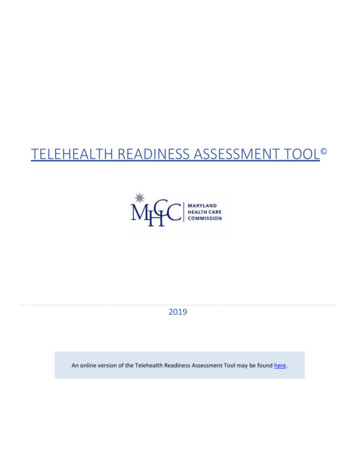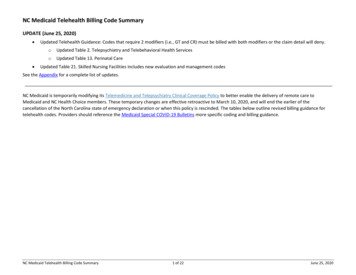
Transcription
2APA PRACTICE ORGANIZATIONMarketplace Trends and OpportunitiesTelehealth: Legal Basics for PsychologistsA 50-state review of telehealth laws and rules yields guidance forpsychologists considering telehealth services delivery.With rapid advances in technology, gone arethe days when interactions between healthcare professionals and patients are limitedto in-person communication.While statistics may be scant, a U.S. Department ofCommerce analysis1 sheds some light on the potentialgrowth of telehealth services. The federal governmentanalysis cited two market research studies from 2008 thatfound “the [U.S.] market for telemedicine devices andservices is forecast to exceed 1.8 billion by the year 20132and that the market is expected to grow at a five-yearcompound annual growth rate of 56 percent.”3And though this trend may not yet have had a broadimpact on psychology practice, an increasing numberof psychologists are raising questions about thepossibility of providing telehealth services in theirstate and across state lines. Psychologists want to knowwhether existing law allows them to provide telehealthservices and, if so, whether additional legal requirementsor restrictions apply.U.S. Department of Commerce, International Trade Administration, Manufacturing and Services, Office of Health and Consumer Goods. (2009, June 25). Telemedicine: animportant force in the transformation of healthcare. Retrieved June 7, 2010, from http://www.ita.doc.gov/td/health/telemedicine 2009.pdf1Marketwire. (2008, July 23). Telemedicine revenues to exceed 1.8 billion by 2013, report projects. Retrieved June 7, 2010, from ojects-882137.htm2Chang. Christine. (2008, November 13). Intel’s health guide puts telehealth in the spotlight (analyst’s opinion). Datamonitor. Retrieved June 7, 2010, from 0.indd 27/1/10 4:09:02 PM
3GOOD PRACTICE Summer 2010This article reflects the results of a recent 50-statereview of telehealth laws by the American PsychologicalAssociation (APA) Practice Directorate’s Legal andRegulatory Affairs Department, including telehealth lawsthat apply specifically to psychologists as well as rules thatapply in states without psychology-specific telehealth laws.Further, we discuss the results of a 50-state telephonesurvey of state psychology boards on enforcement activityrelated to providing telehealth services. The articleconcludes with a framework for practitioners to identifyrelevant legal provisions when they consider providingtelehealth services.What is Telehealth?The term “telehealth services” can be defined broadly toinclude all interactions that are not in-person between healthcare professionals and their patients. Organizations that havedeveloped telehealth guidelines for health care practitionersoften use this definition. Regulators and insurers, however,often use much narrower definitions of telehealth services,depending on what particular services they are trying toregulate or reimburse. So there is no universal definition oftelehealth services.Differing definitions of telehealth appear in various federaland state laws, reimbursement policies, organization orfacility policies or treatment guidelines, with the definitionchanging depending on the purpose and/or coverage termsof the law or policy at issue. For example, many definitionsinclude only telehealth services furnished via audio-videodevices, excluding phone and e-mail. Reimbursement policiesusing that definition would pay only for services that werefurnished using audio-video devices.Other definitions are specific to the type of provider. Forexample, general telehealth laws may define “provider” in away that includes physicians but excludes psychologists. Inthat case, the psychologist would not be subject to the law’srestrictions, nor would the psychologist benefit from any ofthe law’s permissions.services are furnished via telehealth, as discussed below.In the absence of a specific telehealth law, psychologistsshould assume that existing licensure and ethicalrequirements apply when providing telehealth services.When analyzing state telehealth laws, it is helpful to focuson three factors: who is covered by the law; what servicesare covered by the law; and what the law requires.Providers Covered by Telehealth LawsWe found 22 states that have telehealth laws, but onlythree of those (California, Kentucky and Vermont) applyto psychologists. We also discovered that telehealth lawsgenerally fall into two categories: those that cover multipleproviders (general telehealth laws); and those that cover asingle type of provider, usually via the provider’s licensurelaw (psychologist-specific laws).Of the three telehealth laws that apply to psychologists,two are general laws covering multiple providers(California and Kentucky), while the third is psychologistspecific (Vermont). Laws in the 19 additional states withtelehealth laws do not appear to apply to psychologists atthis time. However, psychologists should be aware ofthese laws. As telehealth becomes more prevalent amongpsychologists and other mental health professionals, statesmay apply their general state laws to these providers.Are Special Credentials Needed?Many states take the view that practitioners should beseparately licensed or credentialed to furnish servicesvia telehealth. For example, some psychologists know ofphysicians who are required to have a special credential.But no state thus far has imposed that obligation onpsychologists, meaning they are not yet required to obtain aspecial “telehealth” license or credential in order to providetelehealth services.State Laws on TelehealthServices Subject to Telehealth LawsWhile our review did not find any state that prohibits theprovision of telehealth services, some states have specifictelehealth laws imposing special requirements whenInformation about what services are covered by telehealthlaws usually is found in the law’s definition of telehealthservices. California and Kentucky have a somewhat narrowcontinued on page 4Summer2010.indd 37/1/10 4:09:02 PM
4APA PRACTICE ORGANIZATIONTelehealth: Legal Basics for Psychologists continued from page 3definition of telehealth covering interactive audio, video orother “electronic media” used in the delivery of health carefor “diagnosis, consultation, treatment, transfer of healthinformation” and education. (See Cal. Bus. & Prof. Code §2290.5(a)(1); KRS § 319.140.) California specifically defines“electronic media” to exclude phone conversations andemail messages between patients and providers, and specifiesthat its law does not apply to interactions where the patientis not directly involved – for example, consultations betweentwo providers where the patient is not present.Vermont, on the other hand, uses a much broader definitionof telehealth that includes services furnished via the “internetor other electronic means.” The law does not specify anyservices as being excluded.What the Telehealth Laws RequireAll three laws include provisions related to disclosure ofinformation to the client, though the requirements aredifferent under each law. These disclosure requirementsappear to be intended to protect the client from risksinherent in furnishing services via telehealth. Examplesinclude potential risks to privacy and confidentiality, orthe fact that a client may not ever visit the psychologist’soffice and would not necessarily know the applicablestate psychology board should he or she want to filea complaint.“In addition to requiring certain disclosures, telehealthlaws sometimes include language to make clear thatexisting laws apply to telehealth services.”California requires that providers inform their clients about:potential risks, consequences and benefits of telehealth; theright to withhold or withdraw consent to treatment; the factthat all confidentiality protections apply, as do existing lawsregarding the patients’ right to access their health information; and the stipulation that information obtained fromtelehealth services cannot be shared for research purposesabsent the client’s consent. All this information must beincluded in both a verbal and written informed consent fromthe patient before any telehealth services are furnished.Failure to comply with these requirements constitutesSummer2010.indd 4unprofessional conduct and the psychologist could besubject to disciplinary action for noncompliance.Like California, Kentucky requires that psychologistsobtain the patient’s informed consent prior to providingtelehealth services, but the law does not specify whatmust be included in the consent.Similarly, Vermont requires that psychologists disclosecertain specified information to their patients, such astheir name, location, type of license, jurisdiction wherelicensed, what they are licensed and trained to do andto whom the client can make a complaint and how.In addition to requiring certain disclosures, telehealth lawssometimes include language to make clear that existing lawsapply to telehealth services. The Kentucky telehealth law, forexample, states that all confidentiality requirements in statelaws and regulations apply to telehealth interactions.Vermont law makes clear that psychologists must be licensedin Vermont as psychologists in order to provide telehealthservices and that telehealth services are subject to theVermont Psychology Board’s laws and rules.Psychology Board Opinions on TelehealthIn states that do not have specific telehealth laws, opinions ordeclaratory statements issued by state psychology boardsprovide a valuable source of information. These opinionsare often provided in response to an inquiry about telehealth,and they indicate how the board believes its laws would applyto telehealth services and how the board might enforce the7/1/10 4:09:02 PM
5GOOD PRACTICE Summer 2010laws if it received a complaint against a psychologist.Licensing boards in Colorado, Florida, Georgia,Massachusetts, North Carolina, Texas, Virginia andWisconsin have issued statements or opinions on telehealth.In nearly all of these opinions, the board emphasizes thatpsychologists must consider carefully the potentialchallenges posed by telehealth services – for example,verifying client identity, dealing with limited or lack of visualand other cues, obtaining informed consent, recognizingpotential confidentiality and privacy problems and taking thenecessary steps to protect confidentiality, ensuring computersecurity and dealing with potential technology failure as wellas addressing billing/payment issues.In addition to written opinions, we were also informedof verbal opinions and reliance on opinions of otherpractitioner licensing boards. For example, the staff of onestate board informed us that telephone therapy would beacceptable so long as the initial consultation between thepatient and psychologist was in-person. Another boardtold us that it relied on the telehealth opinion written bythe counseling board in that state. Where state psychologylicensing boards do not have written policies in place,some boards may have considered the issue of telehealthand adopted an informal policy. Psychologists should keepthemselves apprised of any telehealth-related policy theirstate board may follow. (See the section “A Framework forIdentifying Legal Limits on Telehealth for Psychologists”on page 6 for additional information.)Accordingly, state psychology boards told us that theywould view the practices described earlier as providingpsychological services in their state without a license. If aclient complained to his or her state psychology board abouta matter that involved telehealth services, that psychologyboard could find that the psychologist violated the state’slaw and impose a sanction. Further, the psychology board inthe client’s state might notify the psychologist’s home stateboard, which would generally have the authority to imposeits own sanctions.Several states have issued official written opinions tomake clear their view that they can regulate out-of-statepsychologists who provide telehealth services. Examplesinclude Florida, Georgia, Massachusetts, North Carolina,Texas and Wisconsin. Some of these opinions address theissue of psychologists who are temporarily away fromtheir home state and wish to continue providing therapyto their in-state clients, while others address the issueof psychologists who wish to furnish services to out-ofstate clients.State Laws on Practicing Across State LinesAnother key issue for many psychologists (and healthproviders in general) is the complex legal question ofwhether psychologists may provide telehealth servicesacross state lines to a client located in a state where thepsychologist is not licensed, or whether the psychologistmay travel out of the state where he or she is licensed butcontinue to provide services to patients in the home state.There is a strong legal argument that when providingpsychology services, the “service” is furnished both wherethe psychologist is located and where the client is located,and psychologists must be licensed in both locations.Psychology boards generally take this position as well. (Inthe absence of a specific law to the contrary, this rule isgenerally accepted for all health care providers.)In Florida, the psychology board responded to an inquirysubmitted by an Ohio psychologist who was planning tolive part-time in Florida. The psychologist asked whethertreating his Ohio patients using telecommunications,including email and videoconferencing, while in Floridarequired psychology licensure in Florida. The boarddetermined that such a situation did constitute thepractice of psychology in Florida, thereby requiringlicensure in that state.continued on page 6Summer2010.indd 57/1/10 4:09:03 PM
6APA PRACTICE ORGANIZATIONTelehealth: Legal Basics for Psychologists continued from page 5In Texas, the psychology board issued an opinion statingthat an “individual who is physically located in anotherstate shall be considered to be practicing psychologyin Texas and therefore, subject to the [Psychologists’Licensing] Act, if a recipient of psychological servicesprovided by the individual is physically located in the stateof Texas.” North Carolina and Massachusetts have issuedsimilar opinions.Though psychology licensing laws generally requirelicensure in both the state where the psychologist islocated and the state where the patient is located,psychologists can achieve what they need in manystates on a temporary basis through temporary or guestlicensure provisions. Under these provisions, states permitpsychologists who are licensed in another state to practicefor some fixed number of days per year in their state.Additional requirements sometimes apply, such as advancenotification and/or approval of temporary practice by thepsychology board. State provisions vary considerably andany psychologist relying on these provisions mustunderstand them well.He lpful Onli ne Too lsA chart summarizing the results of our 50-statereview of telehealth is available ealthslides.pdf) at Practice Central, the APA PracticeOrganization website. The chart identifies theavailability of temporary/guest licensure on a stateby-state basis, along with additional details related totelehealth services delivery in each state. Please notethat this chart does not substitute for the psychologistspeaking to the applicable state board about the state’stemporary licensure provisions.Another tool that some psychologists may find usefulis the Interjurisdictional Practice Certificate (IPC),recently adopted by the Association for State andProvincial Psychology Boards (ASPPB). This certificateis intended to facilitate temporary practice in otherstates by licensed psychologists. Additional informationis available on the ASPPB website (asppb.net).Summer2010.indd 6Enforcement Activity When Practicing TelehealthAcross State LinesVery few legal cases address the issue of practicingtelehealth across state lines. Those we found addresslaws that apply specifically to physicians. Since not allenforcement actions result in lawsuits, we conducted asurvey of state psychology boards to determine the level ofenforcement activity regarding telehealth practice acrossstate lines. None of the boards reported any significantenforcement activity.Generally, when asked about telehealth, psychologyboard representatives said that they had not received anycomplaints in this area and therefore had not taken anyaction. The boards generally believed that they have theauthority to take action if a complaint were to arise aboutservices being provided by an out-of-state psychologist.Being aware of health care professionals who providetelehealth services across state lines on a routine basis maylead other practitioners to think that it must be legal toengage in such activity. That conclusion is not necessarilywarranted. Some health care professionals seem to be willingto take the risk that enforcement action may be taken againstthem given scant enforcement actions thus far.A Framework for Identifying Legal Limits onTelehealth for PsychologistsIf a licensed psychologist is interested in providingtelehealth services and is practicing in a state thatlacks telehealth laws or clear policies, the issue of riskmanagement arises. Taking the following steps may helpmitigate the risk of delivering telehealth services.First, check with the psychology licensing board to confirmwhether the board has considered the issue of telehealthand has issued any related policies – written as well asverbal. The field of telehealth is fluid and evolving. Checkingperiodically on psychology board policies, as well as generalstate laws and regulations related to telehealth, is prudent.In general, information about psychology licensing laws,regulations and board policies can be found on the statepsychology board’s website. Licensing board contactinformation is available online at the Association of Stateand Provincial Psychology Boards website at asppb.net.7/1/10 4:09:03 PM
7GOOD PRACTICE Summer 2010State laws, including telehealth laws if enacted in yourstate, generally can be found on your state legislatures’website. To access that website, try entering the name ofyour state followed by the word “legislature” into a searchengine such as GoogleTM. The Center for Telehealth andE-Health Law (telehealthlawcenter.org) is another usefulonline resource for information on general telehealth laws.informed consent requirements and ethical standards. Forexample, use of telehealth may require specific disclosuresabout the limits of telehealth services, the potential fordisruption in services and potential risks to confidentiality.Ethical requirements continue to apply to psychologistswhenever they are rendering services, including whendoing so via telehealth.Second, it is important to contact your malpractice carrierto confirm whether telehealth services – in-state and/oracross jurisdictional lines – would be covered under yourmalpractice policy.Reimbursement considerations are also important.While most payers are not yet reimbursing generally fortelehealth services, there seems to be growing acceptanceamong insurers related to using audio-video technologiesin certain situations. For example, Medicare allows forcoverage of telehealth services provided in certaindesignated settings to beneficiaries located in rural areas.It is important to check with any applicable payer(s) tofind out their reimbursement policies before providing andbilling for telehealth services. A more detailed discussionof reimbursement and other topics related to telehealthwill be the subject of future articles from the APAPractice Organization.Third, if you are interested in providing services acrossstate lines, determine whether psychology licensing lawsin the applicable states have temporary or guest licensureprovisions that allow out-of-state psychologists to provideservices for a short period of time. Temporary or guestlicensure might be an attractive option for a psychologistwhose patient might be in another state on a short-termbasis. Not all states allow for temporary licensure. Youneed to understand clearly what states provide for guestlicensure, how many days during a calendar year you mayprovide services under such licensure and whether youmust obtain advance approval from the psychology board.If you do provide services across state lines, you should alsobe aware of the other state’s requirements for providingpsychological services, such as patient consent,confidentiality and duty to warn.Another option is getting licensed in other states whereyour patients may be regularly located – for example, if youwork in Florida and a significant percentage of your clientsspend summers in other states. While licensure in multiplejurisdictions may result in increased costs (for example,licensure fees) and time commitment (such as to meetcontinuing education requirements), it would also lessenthe risks posed by practicing across state lines.Telehealth GuidelinesThe two organizations identified below have publishedguidelines on providing mental health services viatelehealth that some practitioners may find useful.Ohio Psychological Association. (2008, April 12, updated2010). Telepsychology guidelines. Retrieved July 7, 2010,from http://bit.ly/OHtelepsychAmerican Telemedicine Association. (2009, October).Practice guidelines for videoconferencing-based telementalhealth. Retrieved June 7, 2010, from http://bit.ly/telemedAdditional Considerations When ProvidingTelehealth ServicesIn addition to looking into laws and regulations thatgovern a psychologist’s provision of telehealth services,many general laws and ethical requirements have specialimplications when considered in light of telehealth. Thesewould include, but not be limited to, federal and stateprivacy and security requirements, confidentiality andGdPrac sum2010 rev.indd 77/12/10 9:14:24 AM
a matter that involved telehealth services, that psychology board could find that the psychologist violated the state's law and impose a sanction. Further, the psychology board in the client's state might notify the psychologist's home state board, which would generally have the authority to impose its own sanctions.











